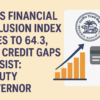
The Reserve Bank of India (RBI) has outlined a comprehensive set of aspirational goals aimed at transforming India’s financial landscape as it approaches its centenary year. Governor Shaktikanta Das announced a multi-year plan encompassing a broad spectrum of initiatives designed to position the RBI as a global leader, deepen financial inclusion, and modernize India’s financial sector.
Monetary policy and liquidity management: The RBI aims to establish itself as a leader among emerging market economies by refining its monetary policy framework. Key focuses include balancing price stability with economic growth, improving communication strategies, and addressing the impact of debt overhang in major economies on emerging markets.
Globalisation of India’s financial sector: To elevate India’s financial sector on the global stage, the RBI plans significant reforms, including expanding domestic banking, positioning 3-5 Indian banks among the top 100 globally, and modernizing financial markets and infrastructure. Supporting the International Financial Services Centres Authority (IFSCA) to make GIFT City a premier international financial centre is also a priority.
Risk-focused supervision: Enhancing supervisory practices is a key goal. The RBI will focus on risk-focused supervision, customer-centric oversight, and building a comprehensive risk assessment framework. Effective corrective actions and the creation of a data analytics universe will further strengthen its supervisory capabilities.
Universalisation of digital payment systems: The RBI aims to internationalize India’s payment systems, including UPI, RTGS, and NEFT, and participate in cross-country payment linkage projects. Domestically, the goal is to increase digital payment usage and implement the Central Bank Digital Currency (e-Rupee) in phases.
Deepening financial inclusion: Ensuring accessibility, availability, and quality of financial services for all societal segments remains a core objective, aiming to extend financial services to underserved populations. To support credit needs, the RBI plans to enhance data collection, create a Comprehensive Credit Information Repository (CCIR), develop a Unified Loan Interface (ULI), and review priority sector guidelines to meet emerging requirements.
INR Internationalisation: The RBI aims to facilitate cross-border transactions in INR, improve access to INR accounts for non-residents, and adopt a measured approach to interest-bearing non-resident deposits. Promoting overseas investments by Indian multinational corporations and global brands is also on the agenda.
Addressing climate change: The RBI will develop a regulatory framework to manage climate-related financial risks. This includes stress testing regulated entities, enhancing payment system resilience to climate risks, and developing climate risk disclosure norms.
Adoption of AI and ML: An AI policy will guide the use of AI/ML for effective supervision, cyber risk management, and economic forecasting. Leveraging RegTech and SupTech will enhance regulatory efficiency. The RBI plans to establish an Indian Financial Cloud to secure financial data and ensure scalability. An internal AI cloud will improve operational efficiency and risk management within the financial sector. Developing a data mesh with regulated entities, utilizing cloud quantum computing services, and geo-tagging data will support high-frequency data analysis and decision-making.
Safeguarding against frauds: The RBI will enhance consumer awareness, strengthen the security of payment systems, and implement proactive fraud prevention and quick redressal measures.







